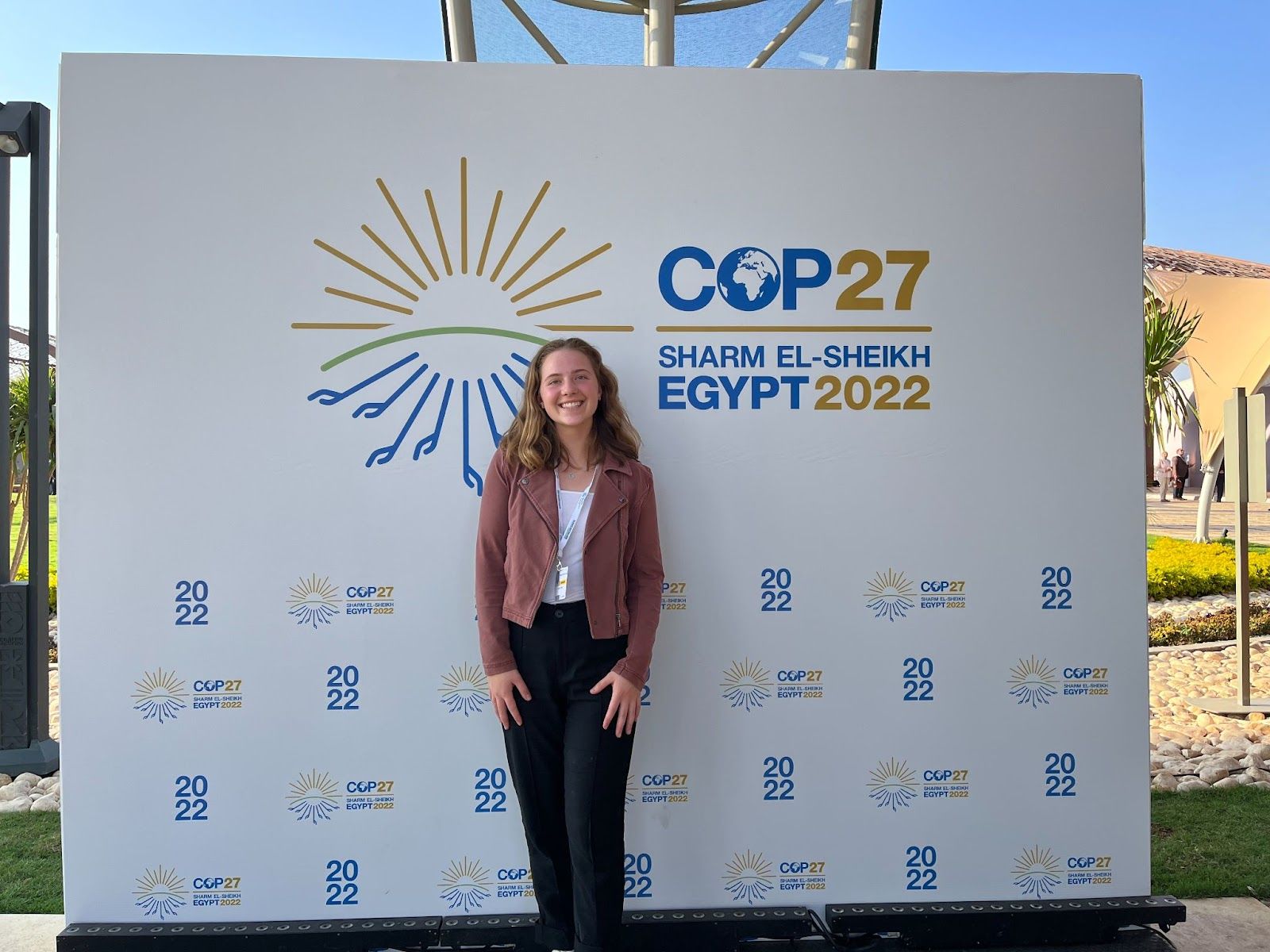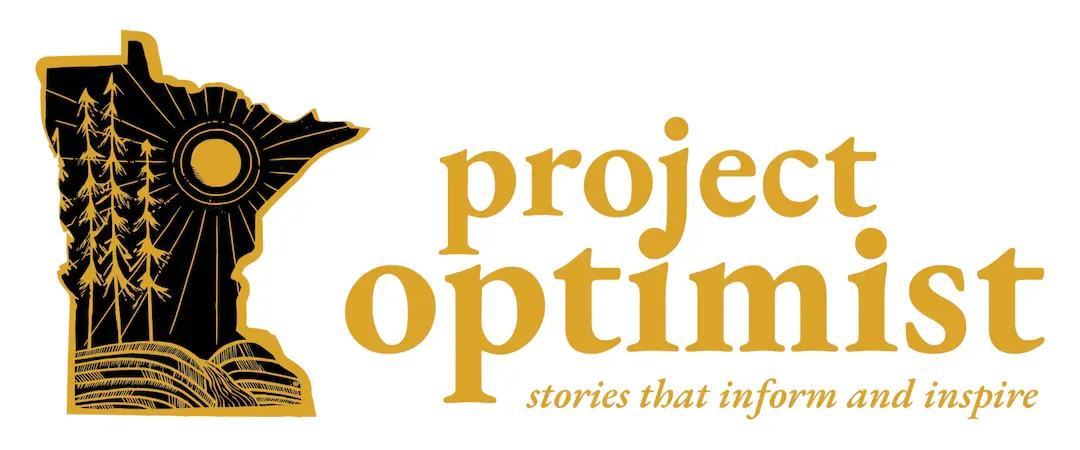Community Voices ⎸ Emotional appeals at COP27 gave weight to the need for international funding
Climate change is having a detrimental impact on millions across the world. People in the most vulnerable positions are pleading for financial support.

This story is part of a grant-funded program at Project Optimist that involved basic journalism training for student and community reporters in central Minnesota. A group of 20 environmental studies students received the training, did field reporting at the U.N. Climate Change Conference and filed stories that highlight their research. Lauren Funke is a junior at the College of St. Benedict and St. John’s University (originally from St. Paul, Minn.) with a major in environmental studies.
I walked around the COP27 conference, weaving through the crowd of rushing people. There were almost a hundred meeting halls, some big enough to hold a sold-out arena and some that could only seat twenty people. I stumbled across a room that was packed full hosting a panel called Frontline Solutions to the Climate Crisis. The event was held in a room that could seat a hundred people. Every chair was filled, and there were people standing against the walls and crowded by the entrance. This panel was unlike any other I attended at the conference. It was by far the event with the rawest emotion and compassion.
There were panelists from the Philippines, Guam, Malaysia, Puerto Rico and Florida telling their stories of how climate change has devastated the health of their land and people. One woman pleaded for developed countries to provide financial support because floods are killing her people and causing so much damage that they cannot recover. As she spoke, the room was silent and I saw compassion and tears on faces throughout the audience. Once she was done, the room roared with applause and shouts of acknowledgement.
Climate change is having a detrimental impact on millions of people across the world, and the people in the most vulnerable positions are pleading for financial support from developed countries so they can survive.
The term loss and damage refers to the impacts of climate change, from both slow-onset events like sea-level rise and desertification, and extreme weather events like cyclones and droughts. Impacts include economic losses such as lost agricultural income or damaged infrastructure and property. It also includes non-economic losses such as loss of life, cultural heritage and Indigenous knowledge.
There have been policies implemented to address loss and damage on a global scale, according to the United Nations Framework Convention on Climate Change. These include the Warsaw International Mechanism for Loss and Damage and the Paris Agreement, but these policies have not been hugely effective because they use vague language that does not require countries to act.
Countries vulnerable to climate change have not benefited from these policies and instead, they are asking for a global finance facility that will compensate for loss and damage. Developing countries suffer disproportionately negative impacts of climate change even though developed countries are the greatest contributors to greenhouse gas emissions, according to Minnesota Interfaith Power & Light.
The global finance fund would be funded by developed countries who have the highest emissions, and the use of funds would be governed by vulnerable countries. This ensures that vulnerable countries are free to use funds most effectively based on their knowledge of the land. It also prevents developed countries from using the funding they provide as leverage to require that vulnerable countries act according to the agenda of the developed world.
At COP27 I spoke with a dozen people from vulnerable countries, and they all strongly supported the idea of a global finance fund. I interviewed Sandra Guzman who is a woman from Mexico and is the founder and coordinator of the Climate Finance Group of Latin America and the Caribbean. She explained that even though some climate finance is being given to vulnerable countries, there is still much more work to be done.
“What is needed is far more than that [climate funding given so far]. The needs report published by the Standing Committee on Finance says that we would need at least $5.8 trillion by 2030. This is more or less $529 billion per year,” said Sandra Guzman, when I interviewed her on November 14.
Achieving success on this scale will require a structured fund like the global finance facility that has a system to hold countries accountable for their pledges.
I interviewed Mary Tahu Paia who is a woman from the Solomon Island National University and is also a member of the Solomon Islands Network. She explained her frustration in the difficulty of developing countries obtaining loss and damage funds and requested that countries have direct access to funds instead of going through an extensive legal process.
“Today we are not given access to funds. One time I was drafting a proposal for this woman in the climate action network and it was turned down because you have to have a lot of criteria and process and most of these women don’t even know how to write. But they understand the environment, they know the changes. They have observed them over the years,” Tahu Paia said when I interviewed her on November 15.
It is clear that the extent of loss and damage due to climate change is devastating many countries, especially those that are most vulnerable. It is also clear that the most-developed countries have contributed the largest amount of greenhouse gas emissions and are suffering the least due to their capacity to adapt.
After attending COP27, performing literature analysis and conducting interviews with people from vulnerable countries all over the world, I conclude that the next step in mitigating climate change is to implement a global finance fund. This is necessary for the survival of infrastructure, families and cultures in vulnerable countries. And it is possible.
Most importantly, for effective change to occur, our global leaders must consider loss and damage a serious issue. They must remember the devastation in the panelist’s voices from Frontlines Solutions to the Climate Crisis as they told us their communities are dying. They must remember the flood of tears and fear that filled the room at the end of this event. We must acknowledge that countries such as the U.S. are responsible for a large amount of the world’s greenhouse gas emissions, and it is our moral obligation to help vulnerable countries that are suffering immensely from climate change. Our global leaders need to keep this all in mind when discussing how much financial support will be given to vulnerable countries. Loss and damage was discussed briefly at COP27, but the topic must be given much more attention at COP28 to show the intensity and urgency it requires.
This column was originally published in the Project Optimist newsletter on Jan. 25, 2023.

Read more about it
From Project Optimist: COLUMN Necessary and imperfect: Finance programs for countries hit hard by climate change
From Carbon Brief: Analysis: Why climate-finance ‘flows’ are falling short of $100B pledge
From Carbon Copy: Developing countries need nearly $6 trillion by 2030 just to cover 40% of their NDCS: UN Report
